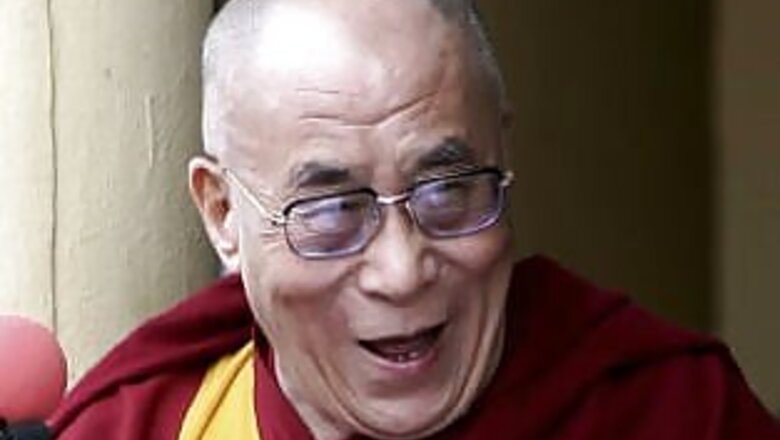
views
Dharamsala: The Dalai Lama, the exiled Tibetan spiritual leader, voiced his support on Wednesday for an ethnic minority in China's troubled Xinjiang province, risking further worsening his fraught relations with Beijing.
In an address marking 51 years since he fled Tibet after a failed uprising against Chinese rule, the Dalai Lama referred to Xinjiang as "East Turkestan", the name given to it by pro-independence exiles. The region is populated by the ethnic minority Uighurs, a Turkic-speaking largely Muslim people.
"Let us also remember the people of East Turkestan who have experienced great difficulties and increased oppression," he told about 3,000 Tibetans in Dharamsala, the northern hill town where the Nobel Peace prize winner has lived for five decades.
"I would like to express my solidarity and stand firmly with them".
Chinese authorities in Xinjiang have waged a heavy-handed campaign against what China calls violent separatist activity by Uighurs. Ethnic violence there last year between Uighurs and majority Han Chinese led to at least 200 deaths.
The Dalai Lama's comments riled Beijing, which reviles the him as a separatist and says he foments violence. The Dalai Lama denies both charges, saying he merely seeks genuine autonomy for the remote region of Tibet.
A commentary in the official Xinhua news agency called the speech "resentful, yet unsurprising", saying it was full of "angry rhetoric".
"Regardless of his allegations of not separating China, the Dalai Lama's request for 'genuine autonomy' on one quarter of the Chinese territory is anything but acceptable for the central government," the Xinhua commentary said, referring to Tibet.
In Dharamsala, thousands of exiled Tibetans, including maroon-robed monks, nuns and many Westerners, marked the day with a march carrying blue-yellow-red Tibetan flags and banners with anti-China messages.
In neighbouring Nepal, police detained about a dozen Tibetan protestors when they tried to storm a Chinese consulate office in the capital Kathmandu. The protestors, who shouted "Free Tibet", were dragged away by riot police to waiting vans.
Appeal to officials
Reaching out to Tibetans working for the Chinese government, the Dalai Lama said: "I invite Tibetan officials serving in various Tibetan autonomous areas to visit Tibetan communities living in the free world, either officially or in a private capacity, to observe the situation for themselves."
China bans Tibetans who work for the government from visiting exile communities, but many ordinary Tibetans make the hazardous and illegal crossing to study Buddhism in Dharamsala.
The Dalai Lama also vowed he and members of his self-proclaimed government-in-exile would not take any political positions if and when the Tibet issue was resolved.
Protests led by Buddhist monks against Chinese rule in March 2008 gave way to torrid violence, with rioters torching shops and turning on residents, including Han Chinese and Hui Muslims. Tibetans see Hans as intruders threatening their culture.
At least 19 people died in the 2008 unrest, which sparked waves of protest across Tibetan areas ahead of the Beijing Olympics. Pro-Tibet groups abroad say more than 200 Tibetans have died in a subsequent crackdown across the region. Beijing has denied that and said it used minimal force.
The Dalai Lama said Beijing had put monks and nuns "in prison-like conditions", making "monasteries function more like museums ... to deliberately annihilate Buddhism".
But he offered to keep talking to the Chinese, despite what he sees as "little hope" of results.
China and the Dalai Lama's envoys have held several rounds of talks since 2002 but made little progress.

















Comments
0 comment